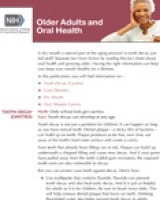Dry Mouth
Overview
Saliva, or spit, is made by the salivary glands and is very important for a healthy mouth. It moistens and breaks down food, washes away food particles from the teeth and gums, and helps people with swallowing. In addition, saliva contains minerals such as calcium and phosphate that help keep teeth strong and fight tooth decay.
Dry mouth, also called xerostomia (ZEER-oh-STOH-mee-ah), is the condition of not having enough saliva to keep the mouth wet. Dry mouth can happen to anyone occasionally—for example, when nervous or stressed. However, when dry mouth persists, it can make chewing, swallowing, and even talking difficult. Dry mouth also increases the risk for tooth decay or fungal infections in the mouth because saliva helps keep harmful germs in check.
Dry mouth is not a normal part of aging. If you think you have dry mouth, see your dentist or doctor to find out why your mouth is dry.
Back to topCauses
There are several possible causes of dry mouth:
- Side effects of some medicines. Hundreds of medicines can cause the salivary glands to make less saliva. For example, medicines for high blood pressure, depression, and bladder-control issues often cause dry mouth.
- Disease. Sjögren's disease, HIV/AIDS, and diabetes can all cause dry mouth.
- Radiation therapy. The salivary glands can be damaged if they are exposed to radiation during cancer treatment.
- Chemotherapy and immunotherapy. Drugs used to treat cancer can make saliva thicker, causing the mouth to feel dry.
- Nerve damage. Injury to the head or neck can damage the nerves that tell the salivary glands to make saliva.
Symptoms
Symptoms of dry mouth include:
- A sticky, dry feeling in the mouth.
- Trouble chewing, swallowing, tasting, or speaking.
- A burning or itchy feeling in the mouth or throat.
- A dry feeling in the throat.
- Cracked lips.
- A dry, rough, red, ‘hairy’, or deeply fissured/cracked appearance.
- Mouth sores.
- Recurrent infections of the mouth or the throat.
- Bad breath.
Diagnosis
Your doctor or dentist will review your medical history and ask about any medications you take. He or she may also suggest blood tests or a test that measures how much saliva you produce.
Back to topTreatment
Depending on the cause of your dry mouth, your health care provider can recommend appropriate treatment. For example, if medication is causing dry mouth, the doctor or dentist may advise changing medications or adjusting the dosages, or may prescribe a saliva substitute. Your health care provider may also suggest the use of artificial saliva or other special products to prevent stickiness and keep your mouth wet.
There are also self-care steps you can take to help ease dry mouth, such as drinking plenty of water, chewing sugarless gum, and avoiding tobacco and alcohol. Good oral care at home and regular dental check-ups will help keep your mouth healthy.
Back to topHelpful Tips
You can relieve dry mouth symptoms by:
- Drinking plenty of water, 8 to 12 cups per day (64–96 ounces or 2-3 liters).
- Sipping water or a sugarless drink during meals. This will make chewing and swallowing easier. It may also improve the taste of food.
- Avoiding or limit drinks with caffeine, such as coffee, tea, and some sodas. Caffeine can dry out the mouth and lead to dehydration.
- Chewing sugarless gum or suck on sugarless hard candy to stimulate saliva flow; citrus, cinnamon, or mint-flavored candies are good choices. Some sugarless chewing gums and candies contain xylitol and may help prevent cavities.
- Being aware that spicy or salty foods may cause pain or a burning sensation in a dry mouth.
- Not using tobacco or alcohol. They dry out the mouth.
- Using a humidifier at night.
Additional Resources
- NIH MedlinePlus Magazine – Summer 2020
TV personality Carrie Ann Inaba talks about her experience with Sjögren's disease; NIDCR shares the latest research on Sjögren’s and answers questions about dry mouth, a common symptom. - MedlinePlus: Dry Mouth
The NIH National Library of Medicine's collection of links to government, professional, and non-profit/voluntary organizations with information on dry mouth. - Sjögren’s Foundation
The Sjögren’s Foundation educates patients and their families about Sjögren’s, increases public and professional awareness of the condition, and encourages research into new treatments and a cure. - Quit Smoking from the Centers for Disease Control and Prevention.
Related Publications
Back to topDry Mouth Research from NIDCR
October 2024


